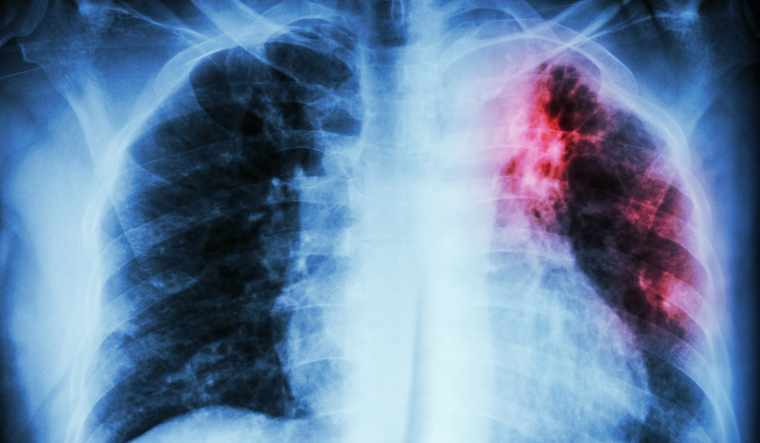The approval of a new tuberculosis drug by the US Food and Drug Administration (USFDA) this week is expected to bring hope for at least 12,000 TB patients in India.
India is among the countries with the highest number of tuberculosis patients. Government data suggests that each year, 1,47,000 persons suffer from multi-drug resistant TB, and over 12,000 have extensively drug-resistant tuberculosis (XDR-TB).
The latest drug to get approval is pretomanid, touted to be a “lifesaver” for people with extensively drug-resistant tuberculosis. The USFDA approval to the drug has come as part of a novel, shorter treatment regimen. According to Médecins Sans Frontières (MSF), an international humanitarian organisation that has been working on TB for 30 years, pretomanid is the third new drug developed for TB in over half a century—the other two being delamanid and bedaquiline—and the first to be developed as part of a ready-to-use treatment regimen.
The three-drug regimen (BPaL: bedaquiline + pretomanid + high-dose linezolid) has been approved for adult patients with XDR-TB, treatment-intolerant, or non-responsive multi-drug resistant pulmonary TB. MSF global spokespersons said the new regimen could “dramatically” shorten treatment length to six months, greatly reduce the number of pills required, and help to increase XDR-TB cure rates from the abysmal figure of 34 per cent.
“The treatment of XDR-TB has been dire ever since this form of the disease was discovered,” said Jay Achar, infectious disease specialist and TB medical advisor at MSF, in a statement. “Having access to effective treatment regimens will give people hope of a cure, and help programmes limit transmission of this deadly bacteria. While safer, simpler regimens are still needed, the shorter treatment duration of this novel regimen is an important step in the right direction.”
The new regimen will be shorter and simpler to administer, but optimism around BPaL is also being balanced against the need for monitoring for side effects from the high doses of linezolid required. According to the USFDA, the most common adverse reactions observed in patients treated with pretomanid in combination with bedaquiline and linezolid included damage to the nerves (peripheral neuropathy), acne, anemia, nausea, vomiting, headache, increased liver enzymes (transaminases and gamma-glutamyltransferase), indigestion (dyspepsia), rash, increased pancreatic enzymes (hyperamylasemia), visual impairment, low blood sugar (hypoglycemia), and diarrhea. pretomanid used in combination with bedaquiline and linezolid should not be used in patients with hypersensitivity to bedaquiline or linezolid.
Separate clinical trials, run by MSF and TB Alliance, are underway to further evaluate pretomanid-containing regimens to try to identify safer future treatment options.
Pretomanid has been developed by TB Alliance, a not-for-profit organisation, funded by governments (Australia, Germany, the UK and the US) and philanthropic sources. According to MSF, the expectation is that the drug would be affordable, and accessible to countries with high disease burden.
In April this year, TB Alliance granted the first license to the US pharmaceutical corporation Mylan to manufacture, register and supply pretomanid. “To date, TB Alliance and Mylan have not made the price of pretomanid public. It has been estimated that generic versions of pretomanid could be produced and sold at a profit for between $0.36 and $1.14 per day. The lowest global prices for the other two drugs in the regimen, bedaquiline and linezolid, already run at around US$3 per day; people needing this treatment regimen would have to take it for six months, amounting to a total price of US$548, before considering the additional price of pretomanid,” MSF said in a statement.
The organisation has called for treatment of drug-resistant TB to be no higher than $500 per person for a complete treatment course.
Four months on, Mylan and TB Alliance have also not made the licensing agreement public, despite calls from civil society for transparency on the terms and conditions that will ultimately impact people’s access to this drug globally. Mylan is expected to bring pretomanid to market by January 2020. However, this is dependent on World Health Organisation's guidance on using the drug, and on Mylan filing for registration in countries with the highest DR-TB burden.
Pretomanid is part of the same class of drugs (nitroimidazoles) as delamanid—one of the two other newer TB drugs approved in the last half century. Delamanid has been developed by pharmaceutical corporation Otsuka, and there are issues of access to the drug due to its high price. The drug is patented in many countries until 2023, including in India, and the price of a six-month treatment course remains very high (the lowest global price is US$1,700). With many patients needing the drug for up to 20 months, the price goes much higher. If pretomanid is affordable compared to delamanid, it has the important potential to spark competition and reduce prices for this class of drugs, MSF said.
In July, Prime Minister Narendra Modi reminded the BJP MPs that India was aiming to achieve TB-free status by the year 2025—five years ahead of the global target (2030). During his previous term too, Modi had written to chief ministers of all states, asking them to work towards eradicating TB. Access to affordable drugs would then be crucial to achieve that target.



